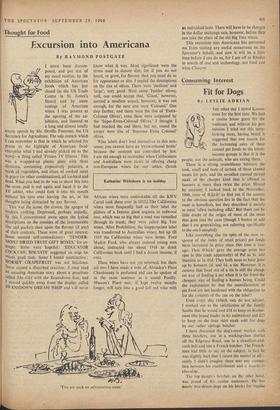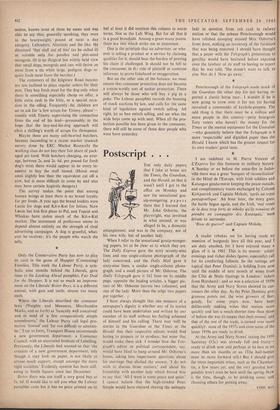Consuming Interest
Fit for Dogs
By LESLIE ADRIAN There is a strong resemblance between the look, smell and taste of certain of these canned meats for pets, and the so-called canned stewed steak of the cheaper kind that is offered to humans at more than twice the price. Moved by curiosity I .looked back to the November, 1960, issue of 11(1,i,ic/i?. to find out if the answer to the obvious question lies in the fact that the meat is horseflesh, but they described it merely as meat 'often including offal.' But there can be little doubt of the origin of most of the meat that goes into the cans (though I hasten to add that 1 am generalising, not referring specifically to the one I sampled).
Like everything else (in spite of the slow re- sponse of the index of retail prices) pet foods have increased in. price since, this time a year ago. Then Which? gave the average price (no rpm in this trade apparently) of Pal as Is. and Stamina as is. Old. They both seem to have gone up by between 4d. and Id. a tin. However, it is curious that food out of a tin is still the cheap- est way of feeding a pet when it is far from the cheapest way of feeding a human being. Could the explanation be that the manufacturers of pet food are not burdened with the obligation to. list the contents of the can on the label?
Used every day (which vets do not advise), I worked out to the 'satisfaction of the family Scottie that he would cost £18 to keep on Kenno- meat (the brand leader in his estimation) and £23 to keep on the lean skirt steak sold for dogs by our rather uPStage butcher.
I have discusied the dog's-meat market with three butchers, one in a working-class district off the Edgware Road, one in a chauffeur-and- cook belt and one a French butcher. The French- man had little to say* on the subject, in fact he was slightly hurt that I raised the matter at all— surely I didn't imagine there was any connec- tion between his establishment and a houcherie. chevaline.
The top people's butcher, on the other hand, was proud of his canine customers. He has nearly two dozen {logs on his books for regular orders, knows most of them by name and was able to say that, generally speaking, they were in the heavyweight, pound of meat a day category, Labradors, Alsatians and the like. He dismissed 'that stuff out of tins' (as he called it) as suitable only for poodles and pint-sized mongrels. (It is an illogical but widely held view that small dogs, mongrels and cats will thrive on meat from a tin while large, pedigree dogs re- quire fresh meat from the butcher.) The customers of the Edgware Road butchel are less inclined to place regular orders for their pets. They buy fresh meat for the dog only when there is something especially cheap on offer, a little extra cash in the kitty, or a special occa- sion in the offing. Frequently the children are set to ask for 'a few scraps for Timmy, please'— usually with Timmy supervising the transaction from the end of his lead—presumably in the hope that the boy-and-his-dog approach will elicit a shilling's worth of scraps for threepence.
Maybe there are many soft-hearted butchers, because (according to a recent market research survey done by ERC Market Research) the working class do not buy their fair share of pack- aged pet food. With butchers charging, on aver- age, between 2s. and 2s. 6d. per pound for fresh dog's meat there would appear to be every in- centive to buy the stuff tinned. (Horse meat costs slightly less than the equivalent cut off a cow, but is more difficult to come by and also may have certain hygienic dangers.) The survey makes the point that among human beings at least there is no brand loyalty for pet foods. A year ago the brand leaders were, Lassie for dogs and Kit-e-Kat for felines. Now Lassie has lost first place to Pal, and Topcat and Whiskas have stolen much of the Kit-e-Kat market. The movement of preference seems to depend almost entirely on the strength of rival advertising campaigns. A dog is grateful, what- ever he receives: it's the people who watch the telly.
Only the Conservative Party has now to play its card in the game of Happier (Consuming) Families. This week the Labour Party, a sym- bolic nine months behind the Liberals, gave issue to the Looking Ahead pamphlet, Fair Deal for the Shopper. It is not so much an improve- ment on the Liberals' Better Buys, it is a different animal, with guts and teeth; almost too many teeth.
Where the Liberals described the consumer laws (Weights and Measures, Merchandise Marks, and so forth) as 'basically well conceived' and in need of 'a few comparatively simple amendments,' the Labour Party call legal pro- tection 'limited' and 'far too difficult to adminis- ter.' True to form, Transport House recommends a new government department, a Consumer Council, with an associated Institute of Labelling. Previously, the Liberals had warned us that 'the creation of a new government department, tidy though it may look on paper, is not likely to arouse much support, except amongst the more rigid socialists.' Evidently opinion has been stiff- ening in Smith Square since last December.
Better Buys was not itself a very good buy at is. 6d. (I would like to tell you what the Labour pamphlet costs but it has no price printed on it) but at least it did mention this column in warm terms. Not so the Left Wing. But for all that it is a good broadside. Among a great many points, there are two which strike me as important.
One is the principle that an advertiser, or who- ever is selling a product or a service by claiming qualities for it, should bear the burden of proving his claim if challenged. It should not be left to the consumer, in thz role of plaintiff or common informer, to prove falsehood or exaggeration.
But on the other side of the balance, we must ensure that consumer protection does not become a cotton-woolly sort of sucker protection. There will always be those who will buy a pig in a poke. The Labour pamphlet records the banning of mock auctions by law, and calls for the same kind of legislation against switch selling. All right, let us ban switch selling, and see what the wide boys come up with next. When all the pro- tection possible has been given to the consumer, there will still be some of those dear people who were born yesterday.







































 Previous page
Previous page